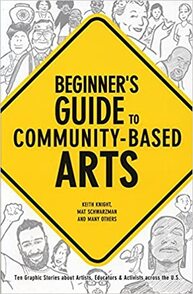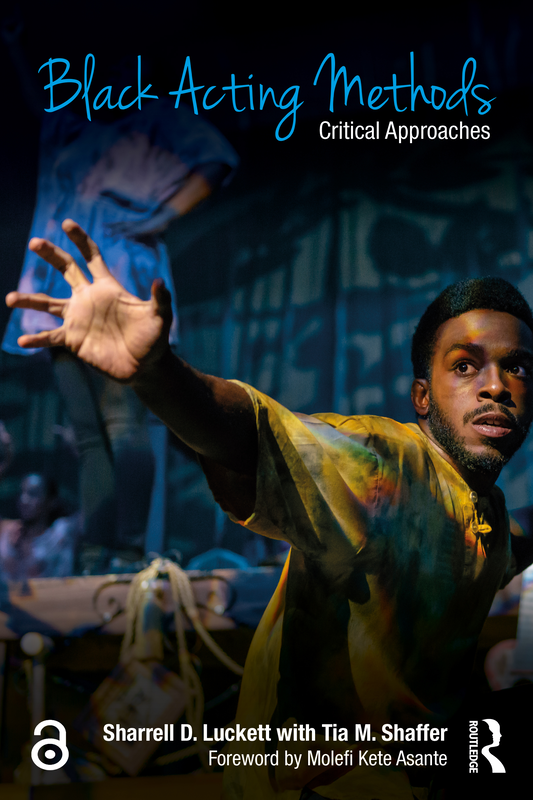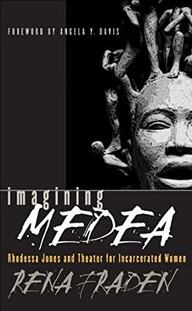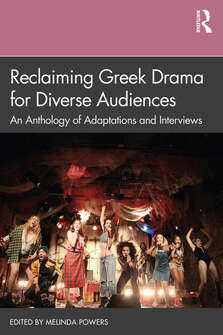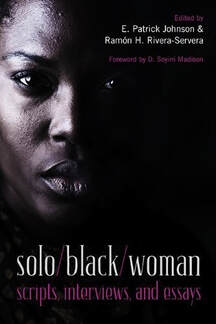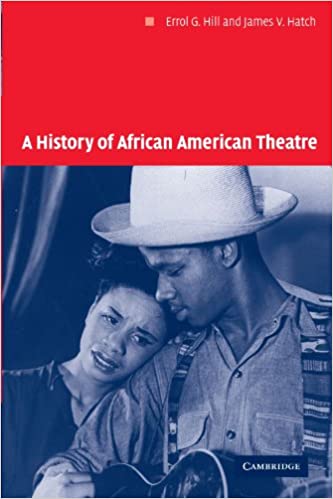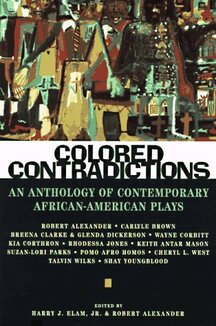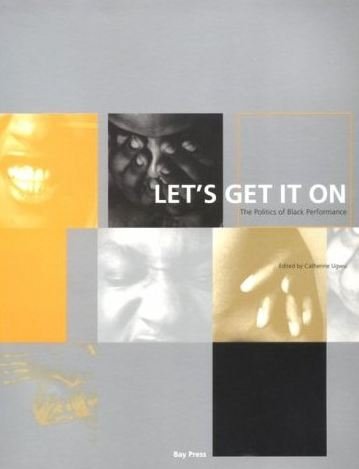PUBLICATIONS & EDUCATIONAL RESOURCES
Beginner's Guide to Community-Based ArtsTen transformative local arts projects come alive in this comics-illustrated training manual for youth leaders and teachers
Packing for the Trip -- Meet Me at the Crossroads -- A New Look -- Let's Go! -- Tales from the Road -- Contact -- I-Am-Going-But-I-Shall-Return Chris Edaakie, Zuni Pueblo -- More Than Aerobics Rhodessa Jones, San Francisco -- Research -- Visual Griot Ricardo Levins Morales, Minneapolis -- Coal Bucket Outlaw Tom Hansell, Kentucky/West Virginia -- Action -- Comadres Mujer Artes, San Antonio -- That Luminous Place Village of Arts and Humanities, Philadelphia -- One Love Isangmahal Arts Kollective, Seattle -- Talk Back Tory Read, Denver -- Town Hall In Cyberspace Picture Projects, New York City/Internet -- Teaching -- Jessie's Story Young Aspirations/Young Artists, New Orleans -- Baggage Claim -- Trailblazers -- Artist Profiles -- Links to the Field -- CRAFT Activities Table -- Sample CRAFT Program Design -- Bios |
Black Acting MethodsBlack Acting Methods seeks to offer alternatives to the Euro-American performance styles that many actors find themselves working with. A wealth of contributions from directors, scholars and actor trainers address afro-centric processes and aesthetics, and interviews with key figures in Black American theatre illuminate their methods. This ground-breaking collection is an essential resource for teachers, students, actors and directors seeking to reclaim, reaffirm or even redefine the role and contributions of Black culture in theatre arts.
NUDGING THE MEMORY: Creating Performance with the Medea Project: Theatre for Incarcerated Women is Chapter 3, written by Rhodessa Jones. (Click box for excerpt). “Nudging the memory” is a response to the frequent inquiries regarding the Medea Project: Theatre for Incarcerated Women’s process from students, teachers, social workers, drama and family therapists, representatives of law enforcement, and of course artists/activists throughout the world. The Medea Project offers guided exploration into the deepest recesses of the female psyche. The Project utilizes self-exploration techniques on an ensemble comprised of inmates, as well as community and professional actresses who stage material derived from the prisoners’ own stories. The ensemble uses the prisoners’ language to explore a wide range of issues and attitudes that perpetuate incarceration, including fear of others, drugs, prostitution, poverty, and single parenthood. The resulting works have not only generated new artistic forms of expression, but have also changed participants’ lives. |
Imagining Medea: Rhodessa Jones & Theater for Incarcerated WomenThis ain't no Dreamgirls," Rhodessa Jones warns participants in the Medea Project, the theater program for incarcerated women that she founded and directs. Her expectations are grounded in reality, tempered, for example, by the fact that women are the fastest growing population in U.S. prisons. Still, Jones believes that by engaging incarcerated women in the process of developing and staging dramatic works based on their own stories, she can push them toward tapping into their own creativity, confronting the problems that landed them in prison, and taking control of their lives.Rena Fraden chronicles the collaborative process of transforming incarcerated women's stories into productions that incorporate Greek mythology, hip-hop music, dance, and autobiography. She captures a diverse array of voices, including those of Jones and other artists, the sheriff and prison guards, and, most vividly, the women themselves. Through compelling narrative and thoughtful commentary, Fraden investigates the Medea Project's blend of art and activism and considers its limits and possibilities for enacting social change.
|
Reclaiming Greek Drama for Diverse Audiences (2021)
|
Reclaiming Greek Drama for Diverse Audiences features the work of Native-American, African-American, Asian-American, Latinx, and LGBTQ theatre artists who engage with social justice issues in seven adaptations of Sophocles’ Antigone, Euripides’ Trojan Women, Hippolytus, Bacchae, Alcestis, and Aristophanes’ Frogs, as well as a work inspired by the myth of the Fates.
Performed between 1989 and 2017 in small theatres across the US, these contemporary works raise awareness about the trafficking of Native-American women, marriage equality, gender justice, women’s empowerment, the social stigma surrounding HIV, immigration policy, and the plight of undocumented workers. The accompanying interviews provide a fascinating insight into the plays, the artists’ inspiration for them, and the importance of studying classics in the college classroom. Readers will benefit from an introduction that discusses practical ways to teach the adaptations, ideas for assignments, and the contextualization of the works within the history of classical reception. Serving as a key resource on incorporating diversity into the teaching of canonical texts for Classics, English, Drama and Theatre Studies students, this anthology is the first to present the work of a range of contemporary theatre artists who utilize ancient Greek source material to explore social, political, and economic issues affecting a variety of underrepresented communities in the US.
|
Staging Migrations Toward an American West: From Ida B. Wells to Rhodessa JonesStaging Migrations toward an American West examines how black women's theatrical and everyday performances of migration toward the American West expose the complexities of their struggles for sociopolitical emancipation. Four case studies consider how the featured women―activist Ida B. Wells, singer Sissieretta "Black Patti” Jones, World War II black female defense-industry workers, and performance artist Rhodessa Jones―imagined and experienced the American West geographically and symbolically at different historical moments.
INTRODUCTION EXCERPT: Given the fact that this project has been constructed on a historical continuum, it is appropriate to consider the status of black women’s access to mobility in the late twentieth and early twenty-first centuries. Chapter 4, “I Want to Go Home,” examines how Rhodessa Jones’s creative process seeks to enable San Francisco inmates and ex-offenders that participate in The Medea Project to make symbolic journeys in which they recall and reevaluate the best and worst parts of their lives. Jones’s lived cultural experiences are a significant part of her performance process. The book concludes with The Medea Project because, while the women with whom Jones works live in an age when African American women in general have presumably made the most social, political, and economic progress, their movements in the West are the most closely policed and controlled. I intend this book to be a source for researchers, educators, students, and a general audience interested in topics like American western and migration histories, theater, performance studies, African American history, and women’s studies. In addition, those persons curious about reimagining the ways we view migration, particularly as it relates to black women’s historical and cultural experiences in the United States, may find it distinctly useful. |
Solo/Black/Woman: Scripts, Interviews, and EssaysThe collection of Solo/Black/Woman features seven solo performances by emerging and established feminist performance artists from the past three decades. The scripts are accompanied by interviews and critical essays, as well as a DVD showcasing the performances. The performers range from Robbie McCauley and Rhodessa Jones, who were at the leading edge of the solo monologue boom of the 1980s, to new talents such as Stacey Robinson and Misty DeBerry. Collectively, their work displays an enormous range of aesthetic approach and thematic emphasis. The anthology offers a comprehensive, stimulating introduction to the beauty, richness, urgency, pleasure, and political promise of black feminist performance.
The second section centers on Rhodessa Jones’s Big-Butt Girls, Hard-Headed Women (1989). The characters Jones embodies in her performance piece are based on the lives and stories of incarcerated women she met while working as a fitness instructor in a women’s prison in the 1980s. Lisa Biggs’s “In the Space Between Living and Dying” unpacks Jones’s critiques of black female stereotypes that were pervasive during the Regan era to show how she used her art to “educat[e] audiences about who is really behind bars and what their journey to jail entailed” (73). E. Patrick Johnson interviews Jones and asks her about the importance of ritual in the play. Jones is reflective in her response: “Each one of us deserves to die some sort of natural death. Ritual is made for all the people who did not make it. There were a lot of people, when I started out working the jail cells that didn’t live to make it. They overdosed. They were murdered. Disappeared. So that was one of the reasons. And this theater is holy” |
History of African American TheatreThis definitive history of African-American theatre embraces companies from across the U.S., as well as the anglophone Caribbean and African-American companies touring Europe, Australia and Africa. Representing a catholicity of styles, from African ritual to European forms, amateur to professional, and political nationalism to integration, the volume covers all aspects of performance. It includes minstrel, vaudeville, and cabaret acts, as well as shows written by whites that used black casts.
|
Colored Contradictions An Anthology of Contemporary African-American Plays
|
Twelve plays, written and produced in the 1990s, reveal the energy and innovation of contemporary black theater in works ranging from traditional family dramas to openly gay plays to post-modern experimental dramas, all celebrating the richness of African-American experience and expression. Original.
|
Let's Get It on: The Politics of Black Performance
|
Cultural Writing. African-American Studies. Performing Arts. LET'S GET IT ON: THE POLITICS OF BLACK PERFORMANCE is a "provocative examination of issues of cultural identity through an investigation of innovative performance practice"-Catherine Ugwu. Produced by ICA Live Arts, a contemporary arts institute in Boston, LET'S GET IT ON, features the art of Reza Abdoh, Elia Arce, Chila Kumari Burman, Ronald Fraser-Monro and more as well as essays by Cosco Fusco and bell hooks and others. The collection evaluates various forms of African-American performance art from the circle of the dance under slavery to carnival and its masquerade of identities, and the validity of the art form in a contemporary society. "This passionate and provocative collection brings together a rich mix of voices to reveal the dazzling creativity of live arts performance at the critical edge of contemporary cultural politics"-Kobena Mercer.
|
SCHOLARLY PUBLICATIONS
An Expressive Therapy Group Disclosure Intervention for Women Living With HIV Improves Social Support, Self-efficacy, and the Safety and Quality of Relationships: A Qualitative Analysis, Journal of the Association of Nurses in AIDS Care, Volume 26, Issue 2, 2015, Pages 187-198.
[Edward L. Machtinger, Sonja M. Lavin, Starr Hilliard, Rhodessa Jones, Jessica E. Haberer, Kristen Capito, Carol Dawson-Rose]
LINK
- Abstract: Women living with HIV (WLHIV) face high rates of morbidity and mortality. HIV disclosure interventions have been identified as a promising but under-evaluated approach for WLHIV to improve their health and well-being. The Medea Project is an expressive therapy group intervention that was first developed to help incarcerated women develop the confidence and skills to tell their stories publicly in theatrical performances. The intervention was subsequently adapted as a community-based disclosure intervention for WLHIV. Our study describes an analysis of the impact of the Medea Project on the lives of the WLHIV who participated. All participating WLHIV publicly disclosed their HIV status during the performances. Five impact themes emerged from the data: sisterhood, catharsis, self-acceptance, safer and healthier relationships, and gaining a voice. Our study identifies a voluntary, effective, and broadly beneficial disclosure intervention for women living with HIV.
“Ancient Myth and Feminist Politics: The Medea Project and San Francisco Women’s Prisons.” In Roman Literature, Reception, and Gender: Domina Illustris, ed. Barbara Gold, Donald Lateiner, Judith Perkins. New York and London: Routledge, 2013. 267-83.
- Abstract: This chapter analyzes the work of Rhodessa Jones’ Medea Project: Theater for Incarcerated Women/HIV Circle, which has often used ancient myth as the basis of modern productions. Jones works with incarcerated women in San Francisco, Johannesburg, South Africa and elsewhere; she asks the women to respond to the ancient stories and to talk about their own lives in relation to them. In Food Taboos, Jones asked how incarcerated women see their own journey to the Underworld and how they relate to Demeter-Persephone. Slouching towards Armageddon takes up the Pandora myth as a framework for analyzing contemporary race relations. In the end, the chapter asks how much societal change can result from individual projects like this.
| Ancient Myth & Feminist Politics | |
| File Size: | 79 kb |
| File Type: | |
“The Medea Project for Incarcerated Women: Liberating Medea.” Syllecta Classica 19 (2008): 237-54.
- Abstract: From the late twentieth and into the early twenty-first century, productions of Greek tragedy have been comparatively frequent; many of them use tragedy as a way to think through contemporary problems from a politically progressive point of view. In this essay, I look at Rhodessa Jones’ Medea Project as one example of these political uses of tragedy. Jones works with incarcerated women in the San Francisco jails; her workshops culminate in public performances at theatrical venues in the city. The essay asks whether and how theater can be politically effective.
| liberating_medea.pdf | |
| File Size: | 365 kb |
| File Type: | |
Interpellating Hyphenated Medusas: Pearl Cleage's Chain and Rhodessa Jones' Big Butt Girls, Hard Headed Women, International Journal Online of Humanities (IJOHMN), Volume 6, Issue 3, Pages 1-35. Dr. Naeema Abdelgawad.
Publication date: 2020/4
LINK
Publication date: 2020/4
LINK
- Abstract: Here they are, returning, arriving over and again, because the unconscious is impregnable. They have wandered around in circles, confined to the narrow room in which they've been given a deadly brainwashing. You can incarcerate them, slow them down, get away with the old Apartheid routine, but for a time only. As so as they begin to speak, at the same time as they're taught their name, they can be caught that their territory is black. Hélène Cixous, "The Laugh of the Medusa" 1975, p. 877 Monomaniac phallic acculturation aligns femininity with whatever attributes repudiated by the masculine world. A male is deemed to be the locus of power and restraint within the family, as well as, its representative in the outer world. In contradiction, a female is commonly associated with passivity, masochism and narcissism. This phallogocentric notion is originated in a misogynic patriarchal ideology that gives rise to the leitmotif of female otherness. The perception of gender boundaries is necessary for males who promote their logic of dualism through incarcerating females into only two fixed metaphors: Angel or Mad. Pearl Cleage and Rhodessa Jones in their plays Chain (1991) and Big Butt Girls, Hard-Headed Women (1990), respectively, press against the externally and internally imposed boundaries confining the African American feminine expression. Theirs is a concurrent issue which gives a collective redefinition of sisterhood; they do not only seek helping black females, but also any female to transcend the downgrading destructive oculocentric, patriarchal ideologies deadening females’ spirit and capability of choice. Coinciding with Louis Althusser’s quest of the way ideology functions in society, the article attempts to explore the metaphorised representation of females through an Angel/Mad binary as well as to examine the prejudiced Freudian psychosexual interpretation of females created by patriarchal Ideological State Apparatus in the context of the Althusserian concept of interpellation.
OTHER WORKS
“Deep in the Night” in Journal of Medical Humanities: Performing Aids. Special Edition: Guest Editor, Therese Jones, Ph.D. Vol. 19, (No.2-3), Summer, 1998, pgs. 181-196.
“Big Butt Girls/Hard Headed Women” in Colored Contradictions: An Anthology of Contemporary African-American Plays, Harry J. Elam, Jr., and Robert Alexander, eds. New York: Penguin Press, 1996, pgs. 359-378.
Bonney, Jo, ed. “Rhodessa Jones: Theater for a New Millennium” in Extreme Exposure: An Anthology of Solo Performance in the Twentieth Century. New York: Theatre Communications Group, 1999, pgs. 145-155.
Effinger, Marta Jenell. Staging Migrations Toward an American West: From Ida B. Wells to Rhodessa Jones. Diss: Northwestern UP, 2000. (Dissertation Abstracts International, 61-06A)
Johnson, Paula C. “Rhodessa Jones, Director, Medea Theatre Project,” in Inner Lives: Voices of African American Women in Prison. New York: New York UP, 2003, pgs. 243-251.
Smoot, Bill. “Rhodessa Jones, Teacher in Women’s Jails,” in Conversations with Great Teachers, Bloomington: Indiana UP, 2010, pgs. 193-199.
Ugwu, Catherine, ed. “Rhodessa Jones” in Let’s Get it On—The Politics of Black Performance, London, UK, Institute of Contemporary Art Press, 1995, pgs. 137-139.
Warner, Sara L. “The Medea Project: Mythic Theater for Incarcerated Women” Feminist Studies 30, no. 2 (Summer 2004), 483-509.
“Big Butt Girls/Hard Headed Women” in Colored Contradictions: An Anthology of Contemporary African-American Plays, Harry J. Elam, Jr., and Robert Alexander, eds. New York: Penguin Press, 1996, pgs. 359-378.
Bonney, Jo, ed. “Rhodessa Jones: Theater for a New Millennium” in Extreme Exposure: An Anthology of Solo Performance in the Twentieth Century. New York: Theatre Communications Group, 1999, pgs. 145-155.
Effinger, Marta Jenell. Staging Migrations Toward an American West: From Ida B. Wells to Rhodessa Jones. Diss: Northwestern UP, 2000. (Dissertation Abstracts International, 61-06A)
Johnson, Paula C. “Rhodessa Jones, Director, Medea Theatre Project,” in Inner Lives: Voices of African American Women in Prison. New York: New York UP, 2003, pgs. 243-251.
Smoot, Bill. “Rhodessa Jones, Teacher in Women’s Jails,” in Conversations with Great Teachers, Bloomington: Indiana UP, 2010, pgs. 193-199.
Ugwu, Catherine, ed. “Rhodessa Jones” in Let’s Get it On—The Politics of Black Performance, London, UK, Institute of Contemporary Art Press, 1995, pgs. 137-139.
Warner, Sara L. “The Medea Project: Mythic Theater for Incarcerated Women” Feminist Studies 30, no. 2 (Summer 2004), 483-509.
